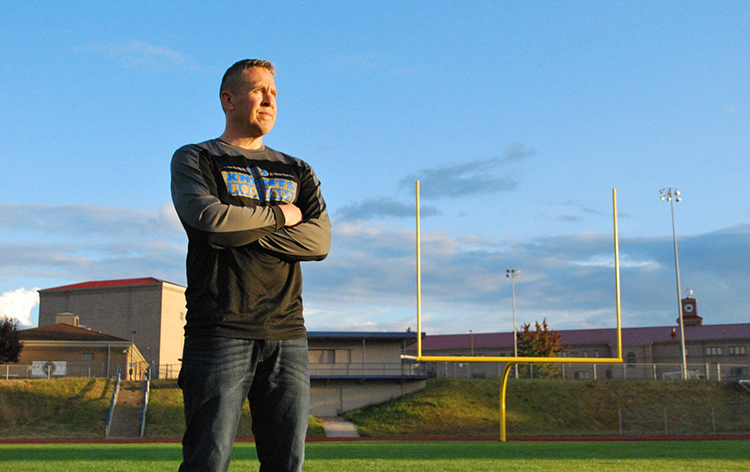Gorsuch and Kavanaugh sour on Lemon endorsement test in praying football coach case

Joseph A. Kennedy of the Bremerton High School in Washington. Kennedy prayed at the 50-yard line after the public high school’s football games. Photo from the First Liberty Institute.
During oral arguments Monday in the case of a praying football coach, U.S. Supreme Court Justices Neil Gorsuch and Brett Kavanaugh appeared ready to abandon a Lemon endorsement test in establishment clause cases.
The justices were part of a conservative majority that appeared sympathetic to the coach, Joseph A. Kennedy of the Bremerton High School in Washington, report the Washington Post, USA Today and Courthouse News Service.
Kennedy prayed at the 50-yard line after the public high school’s football games. Initially, he prayed alone. But eventually, most of the team joined him. He also participated in locker room prayers before games and gave motivational talks with references to religion.
After receiving a complaint, the school superintendent told Kennedy that he had to stop the pregame and postgame prayers, and he could only pray on the job if it was “nondemonstrative.” Kennedy toned down his praying, but about a month later, he announced that he would be returning to the 50-yard line for prayers. Members of the opposing team joined him, as did members of the public.
Kennedy was placed on administrative leave. The school district did not renew his contract, according to USA Today.
The school district had argued that Kennedy’s prayers could be seen as coercive and an endorsement of religion that is prohibited under the First Amendment’s establishment clause. Kennedy had argued that his prayer was protected by his First Amendment rights of free speech and free exercise.
Law.com’s coverage focused on Gorsuch’s and Kavanaugh’s negative comments regarding an aspect of the Lemon test, derived from the 1971 Supreme Court ruling Lemon v. Kurtzman. The initial test said government action doesn’t violate the establishment clause when it has a significant secular or nonreligious purpose, does not have the primary effect of advancing or inhibiting religion, and doesn’t foster excessive entanglement between government and religion.
In a later case in 1984, then-Justice Sandra Day O’Connor wrote that “the purpose prong” of the Lemon test is asking whether the government purpose is to endorse or disapprove of religion, according to the Free Speech Center at the Middle Tennessee State University. Some courts have incorporated the endorsement analysis to the Lemon test, according to USA Today.
Gorsuch raised the Lemon issue when he said the school district’s argument was “based on kind of our Lemon endorsement test,” according to Law.com. He asked Kennedy’s lawyer, Kirkland & Ellis partner Paul Clement, to expand on why the test was wrong and why an alternative test based on coercion is better.
Clement said the Supreme Court has repeatedly said tolerating private religious speech is not endorsement, yet school districts continue to make decisions based on “misguided endorsement concerns.” Those mistakes are “an excellent, excellent reason to be as emphatic as possible in overruling endorsement cases. If it requires formally overruling Lemon and the endorsement tests that come from that, I think that would be very helpful,” he said.
Kavanaugh said the Supreme Court has not applied the Lemon endorsement test in several decades.
“At least I’ve said I don’t think there is such a test in our case law anymore, the Lemon endorsement test, correct?”
“Sure,” Clement responded. “It’s a stubborn fruit, and I don’t think just pushing a pencil through it has done the trick. I mean, you really have to slice it in half.”
See also:
ABAJournal.com: “In praying football coach case, 4 SCOTUS justices criticize 9th Circuit’s ‘highly tendentious’ reading of precedent”
ABAJournal.com: “SCOTUS rules Peace Cross memorial on government land does not violate establishment clause”
ABAJournal.com: “Uncensored clergy prayers should be allowed before town meetings, 23 states argue in SCOTUS brief”



